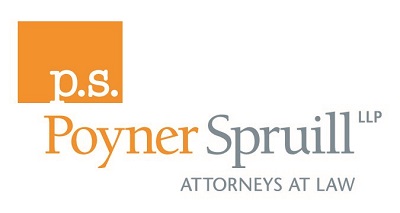
Need Construction Legal Advice? Look No Further Than Poyner Spruill’s Matt Bouchard
On any given day, you can find Poyner Spruill LLP partner Matt Bouchard busy negotiating commercial construction contracts, resolving multi-million dollar disputes, or counseling clients on successful project completion.
Bouchard leads the firm’s Construction Law Practice Area, a group of five attorneys who focus on commercial construction matters in the Carolinas. The team handles everything from drafting construction contracts; prosecuting and defending payment, change order, delay, termination, and defect claims; and defending clients against OSHA claims.
Groundbreak Carolinas sat down with Bouchard to discuss his background, the construction law field, and trends affecting the commercial construction industry.
Tell us about your background.
I just celebrated my fourth anniversary at Poyner Spruill. After obtaining my J.D. from the University of North Carolina School of Law, I began my law practice in Boston in 2001 in general commercial litigation. I found myself doing work with several of my first firm’s construction law partners and really enjoyed the experience. When those partners made me an offer to serve as a full-time construction law associate, it was an easy “yes.” I’ve been practicing construction and surety law exclusively ever since over the last twenty years.
I returned to North Carolina in 2006 and immediately got involved with the North Carolina Bar Association’s Construction Law Section, serving as Chair for the 2020-2021 term. Service in the Section has been an invaluable opportunity to get to know the vast majority of folks across the state who are full-time construction lawyers. That familiarity has paid significant dividends when negotiating contracts and resolving claims with my peers—having strong relationships with other construction attorneys, who know me to be an honest broker, makes it easier to sit across the table, work through thorny issues, and obtain beneficial results.
You work out of Poyner Spruill’s Raleigh office. Are your clients mostly in the area?
Much of my work is generated from North Carolina-based clients, but increasingly, our group is providing services for folks who have a larger reach in South Carolina, across the Southeast, and beyond.
How are you involved in the community?
I’m currently serving as Chair for the Durham Historic Preservation Commission. It’s a nice complement to my legal practice; while the construction of new projects is the lifeblood of my professional work, volunteering on the Commission is a wonderful way to help Durham’s historic communities retain a sense of place amid all the changes and new construction.
What was a significant case that you worked on recently?
We represented a general contractor on a community college project that was delayed due to a number of factors, primarily multiple design changes. After substantial completion, our client, in concert with the project’s electrical and mechanical subcontractors, submitted claims to the owner for recovery of the delay costs. The claims sought recovery for two types of damages: the contractors’ extended general conditions expenses and their unabsorbed home office overhead costs.
The parties proceeded to mediate the case early on, during which the owner made a compelling argument that under applicable North Carolina law, it likely would not be found liable for the unabsorbed home office overhead damages. The owner was, however, willing to settle for the full value of the three extended general conditions claims. Our client agreed that it was a fair outcome, settled with the owner, and then settled with the electrical subcontractor, all with hardly any litigation.
The mechanical subcontractor, however, wasn’t willing to concede on its unabsorbed home office overhead claim and elected to arbitrate all of its claims against our client. The arbitrator entered an award in our client’s favor, concluding not only that the subcontractor had failed to prove its claim for home office overhead, but also that its field cost documentation didn’t fully support the extended general conditions claim it had asserted. At the end of the day, we were able to achieve a timely result to the delay claim asserted against the owner, while avoiding liability to the mechanical subcontractor for the unabsorbed home office costs it had claimed. All in all, a great result.
How have you seen the construction industry change since you started practicing law?
I think we’re in a period of increased collaboration and innovation. While traditional design-bid-build project delivery works for many projects, more collaborative approaches, like construction management at-risk and design-build, can help stakeholders more effectively collaborate, manage the uncertainty surrounding the labor and material markets, and complete projects on time and under budget. In particular, we’re seeing more public owners availing themselves of the design-build legislation that went into effect about a decade ago. We’re also likely to see increased use of modular construction, AI, and other technologies to help build projects more efficiently.
We’re seeing a concerted effort on the part of many stakeholders to diversify their talent. I strongly believe that having folks from various backgrounds with different viewpoints can help drive innovation within the industry. Construction companies that emphasize diversity and inclusion are finding that they are more profitable and better able to retain their talent, which is a huge advantage given the demographic changes the industry has experienced in the last decade. As more women and diverse candidates fill construction positions at all levels, the more dynamic and resilient our industry will be.
What are the Poyner Spruill Construction Practice Area’s goals for the future?
We want to continue to provide top-notch, timely, and cost-effective legal services to our existing clients. We would also like to introduce ourselves to those in the industry, both in the Carolinas and nationwide, who may not be as familiar with our capabilities. Our goal is to grow what is already a thriving and exceptional practice.
How does Poyner Spruill differ from other firms that offer construction law services?
Our entire team is nimble and creative. We have attorneys with significant experience representing industry stakeholders up and down the contractual chain — owners, prime contractors, subcontractors, material suppliers, sureties, and design professionals. Partner Tom Davis has invaluable OSHA experience and regularly handles workplace safety issues. Partners Sarah DiFranco and Tate Ogburn, both of whom are licensed in North Carolina and South Carolina, are seasoned construction litigators who have substantial experience representing clients in state and federal courts. Partner Ben Buskirk grew up in the industry—his dad is a general contractor, he’s a civil engineer by training, and he gained six years of project management experience before going to law school. Ben’s depth of knowledge about the industry and how projects get designed and built from soup-to-nuts has proven indispensable to our practice.
Outside of our construction team, Poyner Spruill is a full-service law firm. Our construction clients can rely on the firm to handle employment matters, creditors’ rights issues, trusts and estates planning, and much more. Having that breadth of knowledge across a variety of legal practice areas increases the value proposition for our construction clients.
How are recent laws affecting the construction industry?
There are a few recent developments in North Carolina law that stand out to me. A late 2020 North Carolina Supreme Court decision reiterating how the economic loss rule operates in the state is continuing to reverberate across the industry. Last year, there were significant limitations placed on the use of lien waivers for progress payments. That same legislation clarified the options available to public owners when procuring design-build projects, and also modified how attorneys’ fees claims should be considered by both judges and arbitrators in connection with mechanics’ liens and public payment bond claims.
What advice do you have for a company considering a commercial construction project?
Make an investment in legal counsel early. I realize that sounds self-serving, but experience tells me that having a knowledgeable construction lawyer review a contract and provide guidance about the risk allocation set forth in a proposed agreement can be critical.
It’s also important to involve attorneys as soon as problems arise. When a client includes an attorney from the beginning, the attorney can understand the case better, evaluate the opposing side’s perspective, weigh risks and rewards, and work to find a resolution that makes sense for all parties, often before the issues become a costly and time-consuming litigation for all involved.

About Poyner Spruill
Poyner Spruill LLP is a full-service North Carolina law firm with four offices conveniently located in Raleigh, Charlotte, Rocky Mount, and Southern Pines. The firm traces its history back to 1883, and since then has helped countless individuals, organizations, and industries locally and globally with their legal needs.
We’re Hiring
Know anyone with construction law experience? Poyner Spruill is hiring a construction litigation associate in the Raleigh office. Apply on our website today.





